I’ve thought about blogging on supermarket self-service checkouts for years but it’s only today when I read this rant about them that I finally opened a fresh page, girded my loins and set forth to type the facts as I see them – or at least allow the eloquence of others to talk on this subject. They seem to annoy everyone in equal measure, including the Daily Mail and Auntie Beeb!
Firstly though, let’s reprise Andrew Webb’s reasons for hating these abominations:
1. They never work, do they? I normally get about four or five items in before hitting the ‘call assistant’ button. The weighing of ingredients is the worst – scrolling though pages of options, trying to find the picture of a fennel bulb. It makes me feel like a toddler operating an educational toy.
2. Scanning, weighing, and moving items quickly along a conveyor belt is a skill. The cashiers at my local supermarket beep so fast that I can barely keep up with the packing. When we have to do it, however, every item takes ages, as we flip it every which way looking for the pesky barcode.
3. I’m normally buying wine along with the shopping, which requires a long wait for the assistant to come over. Someone I don’t know has to assert that ‘the customer is over 18’. I’m left looking like a lush.
4. They’re everywhere! Tesco’s flagship store in Covent Garden (closed temporarily in 2012 for mice infestation) is now nearly entirely self-service, where once it had till lanes. Even Boots the chemist has them in store now. Worse, they’ve escaped from supermarkets into other places. Cash-strapped Leicestershire council have put them in their libraries!
5.They increase shoplifting. One third of us admit to stealing items while using self-service checkouts (the other two thirds just lied). Putting expensive orange peppers through as cheap-as-chips carrots is one popular dodge. Ultimately that cost is passed on to the rest of us.
6. They take away jobs. Many supermarkets said it would free up staff to be more active on the shop floor, helping customers and stocking shelves. Hasn’t really happened though, has it? At least not in the supermarkets I’ve been in. Instead one member of staff now has to ‘manage’ six different tills like a magician spinning plates.
7. They were meant to cut queues, but in a test conducted by the Sunday Telegraph, the same basket of shopping was processed quicker at the traditional checkout rather than the self service.
8. I hate the chirpy voice they all have. When the two dozen or so in my local supermarket all get going, it’s like a retail rendition of Spem in alium. If we must have these things, can’t they all speak in a staccato robot voice and say things like ‘ERROR – DOES NOT COMPUTE’.
9. I want better technology! We never get the future we’re promised, do we? Where’s the self-scanning trolley we were told about in 2002 that would scan everything and let us just walk out? That said, Waitrose do have the Quick Check handheld scanners in some of their stores, which lets you scan as you go, pay, and leave.
10. Finally, it’s the thin end of the wedge… like banks, I’m sure supermarkets would LOVE to offer a premium service they could charge for. In the not too distant future, having a human being politely talk to you, pack your shopping in luxury cotton bags, and even carry them to the car will cost you. Can’t afford it? The robots are over there…
Maybe I’m very unusual here but I really really don’t shoplift!! If anything I’m too assiduously honest, but to that list my first point is that the machines assume in their euphemistic way that I AM up to no good: “Unexpected item in the baggage area!” they warble as if I’ve secreted the contents of my pockets in one of their bags.
Just as bad is the alternative when I have been struggling to open a bag in which to place the item I have just scanned, only to be told: “PLEASE place the item in the bagging area,” to which my preferred response would be: “PLEASE fuck off!”
Yes, even the mild-mannered can quickly turn mean and nasty when confronted with overly polite machines instructing you to do things you had every intention of doing, yet failing to understand why you had not done them!!
Denise Winterman’s article gives a more objective analysis:
Unexpected item in the bagging area? Totally expected feeling of rage pumping through your body? You’re not alone. New research suggests 48% of Britons think self-service checkouts are a nightmare, neither quick nor convenient. Quite the opposite in fact, and their complaints are all too familiar.
Firstly, there’s the bag struggle. Shoppers who follow the “bag for life” mantra may feel they aren’t as welcome as they would expect. Self-service checkouts often don’t recognise them and shoppers may even be charged for plastic bags they haven’t used.
Then there’s the barcode blindness the machines experience with maddening regularity. There’s nearly always something they refuse to scan, leaving customers repeatedly swiping, running the risk of repetitive strain injury and feeling a pang of sympathy for those who do this for a living.
Finally scanned? Now try and put it in the carrier bag. The phrase “unexpected item in the bagging area” is so synonymous with the 21st Century shopping experience it’s become a T-shirt slogan. What’s so unexpected anyway? You only swiped the item a second ago and were charged for it.
 To queue for a self-service till, or the real person tills
To queue for a self-service till, or the real person tills“It’s like the machine is very publicly saying ‘you are too stupid to do this – go home now’. It’s far from ideal,” says Bjorn Weber, of retail analysts Planet Retail.
Finally, after the palaver of paying, there’s the nervousness about leaving the shop. Did I scan it all correctly? Did I select the right type of bread roll from the menu? Will I feel the long arm of the store (manager) on my shoulder as I walk out the shop?
“I spend half my time worrying that security will arrest me for selecting the wrong price Blueberry muffin,” said shopper Sharon Adams when consulted in a survey on self-service tills conducted by Fatcheese.
But it’s not as simple as all-out hate for these tills. The people who like them, really like them, say the supermarkets. And they’re probably counting among them that contingent of people who have always secretly hankered after trying their hand as a checkout assistant.
Self-service checkouts present an opportunity for these frustrated souls. On the rare occasion a basket of shopping goes through without any hitches there’s a disproportional sense of satisfaction. Or am I the only one who feels this?
However, this occasional buzz doesn’t make up for the time spent battling with the machines. But whether we want them or not, they are here and their numbers are set to grow.
First introduced in the UK in the 1990s, the number of self-service checkouts is set to double in the next few years. This is because they offer supermarkets quick cost savings and in today’s economic and highly competitive retail climate, that has got to be a good thing.
 Old-style self-service – it meant choosing your own groceries
Old-style self-service – it meant choosing your own groceriesTesco, the UK’s biggest supermarket, also leads the do-it-yourself checkout league, with self-service counters in 256 stores. The tills process 25% of all transactions in those shops. Sainsbury’s has them in 220 stores and is planning more. And while it may seem extremely trusting to get us to scan our own goods, the machines have in-built weight controls as security measures.
Waitrose offers a variation on the theme. It has no such tills but has a Quick Check service where people scan and pack items as they shop. The aim is to really cut back on time at the till.
Supermarkets say the move towards self-service checkouts is not all about cutting costs. They argue the tills can speed up your shopping trip, says Ahmed Zaman, from shopping website Fatcheese, which conducted the research, “But many shoppers have yet to be convinced that they really save time,” he says.
That’s because they only do in extremely selective circumstances – if you have one item and can walk straight up to a self-service till for example.
“People perceive self-service checkouts to be quicker but that’s because they are actually doing the work,” says Mr Weber. “In reality they take longer than someone serving you, but it’s annoying for the shopper to stand around waiting.
“This is even the case in countries like the US, where they’ve had such checkouts for years and shoppers are very experienced at using them.”
People’s dislike of such tills could also be down to something that is very British, he believes. Despite Brit’s reputation for being reserved, we like to speak to the people serving us.
 Some like a bit of banter
Some like a bit of banter“If you go to a supermarket in Germany or Spain or Italy, customers might acknowledge the person on the till but they won’t speak to them,” says Mr Weber. “It’s different in the UK, people do speak to them and like to have a conversation.”
In the past shopping was all about such personal service, but over the years it has become more and more impersonal. From grocery shops, to supermarkets, to shopping on the internet and now the expansion of self-service tills, face-to-face time has been reduced or even excised completely from the shopping experience. Are we becoming antisocial?
Not really, our choice is just expanding, says Mr Weber. The key to success is still providing a good service and clued-up retailers are moving the staff they take off tills on to the shop floor. “That’s where the real service takes place,” he says. “Not at the checkout.”
And the expansion of such tills does not signal the end of manned ones, not in Britain anyway as it is a distinctly different market for most other countries.
Tesco has one express store, opened in Northampton in October, that is self-service only and supervised by just one member of staff. It’s just a trial, it says, and there are no plans to open any of its larger supermarkets without checkout staff, like in the US.
“Staffing is important in the UK,” says Mr Weber. “Supermarkets know long queues don’t benefit them. If it’s busy they will open more manned tills.”
Not surprisingly, the supermarkets agree. “We’d never get completely rid of manned tills,” says the Sainsbury’s spokeswoman. “For us it’s all about offering people the choice. Self-service checkouts are very popular with the customers who use them a lot, but we realise people either like them or they don’t.”
But for many self-service haters, it comes down to two things. Don’t say something is time-saving when it hardly ever is. Also, they’re not getting paid, so don’t make them do the work.
Of course there is the mobile self-scan option at some supermarkets, which does genuinely save time, albeit with a genuine risk of shoplifting. I’d prefer to be trusted and treated as an adult, though most supermarkets still insist on these awful checkout devices in spite of the fact that they technology is a very long way from perfect. Time for a change!
PS. 24 Jan 2014: My patience finally snapped. It could have been any of the inane messages they come out with, but it was the one where I had a shopping bag in which was stored a purchase (with receipt) from a different shop. “Please wait for assistance,” chirruped the machine, “we need to verify your bag.” Except there was no assistant within vision. I waited a few minutes but when nobody was forthcoming I gave up and took my shopping to a checkout, at which (a) the assistant was friendly, helpful and smiling, (b) the queue was shorter than at the self-checkouts, and (c) the hassle and stress factor was non-existent.
These machines make the shopping experience worse, not better. Bringing back people would ultimately save time and cost for the supermarkets, not to mention major fits of checkout rage on the part of customers. Ditch them now!

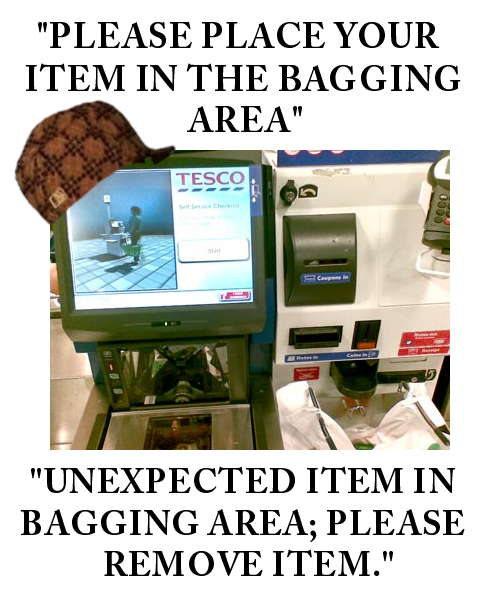
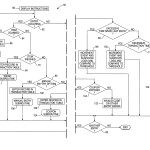
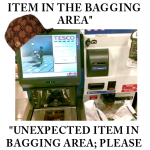

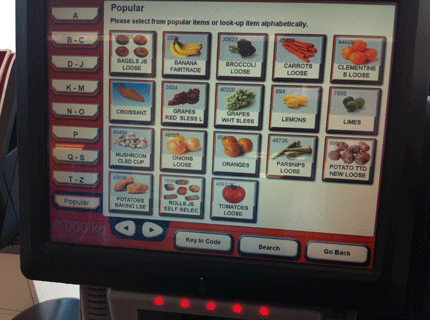
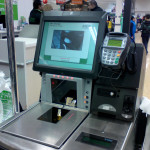
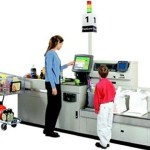
Totaltills,ourlocal Asda do !!